Currently Empty: ₦0.00
Technology
Top 10 Most Profitable Tech Skills To Learn In Nigeria

Let’s be honest here.
Most people learning one tech skill or the other are doing it purely because of the financial benefits or rewarding salaries.
According to a recent report by Glassdoor, some tech roles in Nigeria can command average salaries ranging from ₦300,000 to ₦1,500,000 per month, depending on expertise and experience.
In fact, 78% of individuals pursuing tech skills in Nigeria cite the potential for higher earnings as their primary motivation.
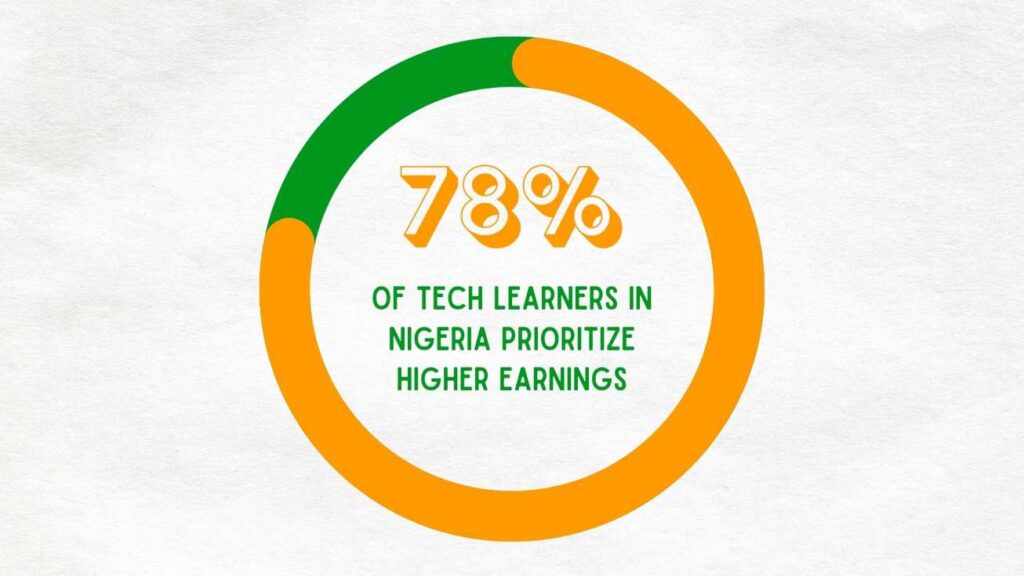
Many people see learning tech skills as a valuable investment in themselves in Nigeria, considering the country’s harsh economic situation.
But which skills truly offer the best return on investment?
Of course, spending money learning tech skills that will not benefit you in the long run won’t be wise.
Though most tech skills are lucrative, some are more lucrative than others.
So, in this blog post on Greenlearners Technologies, I will show you the top 10 most profitable tech skills to learn in Nigeria.
These tech skills will enable you, not only to secure high-paying tech roles but also to establish successful tech businesses for yourself legitimately in Nigeria.
Nigeria Is A Big Market When It Comes To Tech In Africa

Nigeria has firmly established itself as a tech powerhouse in Africa, with Lagos often dubbed the “Silicon Valley of Africa.“
According to a 2021 report by Startup Genome, Lagos ranks as the top startup ecosystem in Africa, with over 400 active startups valued at $2 billion.
Cities like Abuja, Port Harcourt, Ibadan, and Enugu are also emerging as significant tech hubs, contributing to a vibrant national tech environment.
“Nigeria’s tech ecosystem raised $1.8 billion in venture capital funding in 2022, accounting for 31% of all funding in Africa,” reports Disrupt Africa’s Nigerian Startup Ecosystem Report 2022.
This growth is driving unprecedented demand for tech talent across various sectors, from fintech and e-commerce to agriculture and education.
Let’s continue to explore the top 10 most profitable tech skills to learn in Nigeria for better opportunities in tech.
Overview of Nigeria’s Tech Ecosystem
Nigeria’s tech ecosystem is one of the fastest-growing in Africa.
Major cities, such as Lagos and Abuja, are hubs for tech startups and multinational corporations.
The rise of fintech, e-commerce, Ed Tech, and digital transformation has paved the way for professionals skilled in areas like software development, data science, and cybersecurity.
Again, with Nigeria’s population of over 200 million, the potential for tech growth is huge and very promising.
I’m a tech professional, and I’ve had many aspiring tech newbies ask me questions like:
- Which tech skills are most in demand in Nigeria?
- What is the highest-paying skill in Nigeria?
If you’re here and asking the same questions, endeavor to read this article to the end, as I provided authentic and up-to-date answers to these questions in this blog post.
Criteria for Selecting the 10 Most Profitable Tech Skills To Learn In Nigeria
The tech skills featured in this list were chosen based on several factors, which include:
- Demand in Nigeria and globally
- Salary Potential
- Career growth prospects
- Availability of remote and freelance work opportunities
- Job Security
- Scalability
- Industry Versatility
The Top 10 Most Profitable Tech Skills To Learn In Nigeria

1. Software Development: The Backbone of Tech Innovation

Annual Salary Range: ₦2.5M – ₦24M per year
Monthly Salary Range: ₦200K – ₦2 Millon per month
According to IBM, software development refers to a set of computer science activities that are dedicated to the process of creating, designing, deploying, and supporting software.
Software itself is the set of instructions or programs that tell a computer what to do. It is independent of hardware and makes computers programmable.
Software development remains one of the highest-paying tech skills in Nigeria, with experienced developers commanding top salaries.
Why Is Software Development Lucrative In Nigeria?
Software development is lucrative in Nigeria because of the growing demand for digital solutions across various industries, including finance, healthcare, and e-commerce, combined with the country’s thriving startup ecosystem.
As businesses increasingly adopt technology to streamline operations and reach broader audiences, skilled developers are in high demand, both locally and globally, offering high salaries, remote work opportunities, and the potential to build successful tech businesses or startups.
Also, there’s a wide gap between the demand for software developers and the available talent pool.
Not just in Nigeria, the worldwide shortage of full-time software developers is expected to grow from 1.4 million in 2021 to 4.0 million by 2025, indicating a dramatic increase in demand for skilled professionals.
The shortage can lead to higher salaries for software developers and provide ample job opportunities.
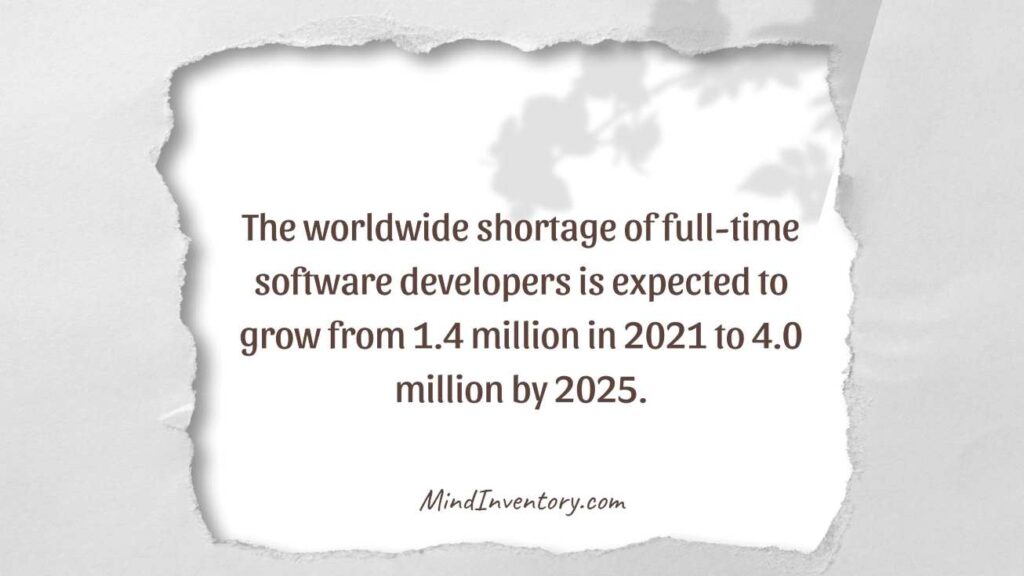
Applications of software development in Nigerian Industries:
- Banking: Development of mobile banking applications and online banking platforms.
- Fintech: Development of online payment gateways, development of mobile wallets, such as Paystack and Flutterwave.
- E-commerce: Creating online marketplaces like Jumia and Konga.
- Agriculture: Development of farm management software; agritech solutions.
- Education: Creation of e-learning platforms and educational apps, such as ULesson.
Industry Tools for software developers include; Visual Studio Code, GitHub, Docker, Node.js, React, Laravel, Django
Some Skills Needed In Software Development:
- Web development (Frontend, Backend, Full Stack)
- Mobile app development (iOS, Android)
- Languages: Python, JavaScript, Java, PHP, Kotlin, Swift
Popular Roles In Software Development: Web developer, mobile app developer, full-stack developer
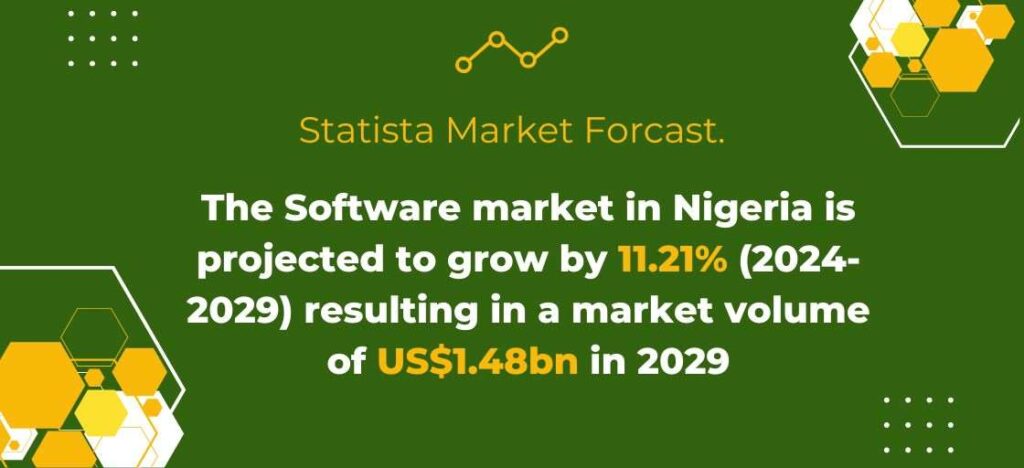
“The Software market in Nigeria is projected to grow by 11.21% (2024-2029) resulting in a market volume of US$1.48bn in 2029, creating a sustained demand for skilled developers – Statista Market Forcast.
2. Data Science and Analytics: Turning Data into Insights

Annual Salary Range: ₦2.5M – ₦10M per year
Monthly Salary Range: ₦208K – ₦833K per month
Data analytics is about making sense of all the data that a business gathers and using it to help the business improve its decision-making.
As businesses increasingly rely on data-driven decision-making, data science has become one of the most in-demand tech skills in Nigeria.
The ability to extract actionable insights from data is invaluable across industries.
A report by Statista highlights that 72% of Nigerian companies are currently using predictive analytics to enhance decision-making processes.
Application Of Data Science And Analytics In Nigerian Industries:
- Banking: Risk assessment, fraud detection, and customer segmentation
- Telecommunications: Network optimization and customer churn prediction
- Healthcare: Disease prediction and treatment optimization
- E-commerce: Personalized product recommendations and demand forecasting
- Agriculture: Crop yield prediction and supply chain optimization
Industry Tools: Python, R, SQL, Tableau, Power BI, TensorFlow, Apache Spark
Some Skills Needed For Data Science And Analytics:
- Data analysis
- Machine learning
- Statistical analysis
- Predictive analytics
Popular Roles In Data Science And Analytics: Data analyst, data scientist, machine learning engineer
3. Cloud Computing
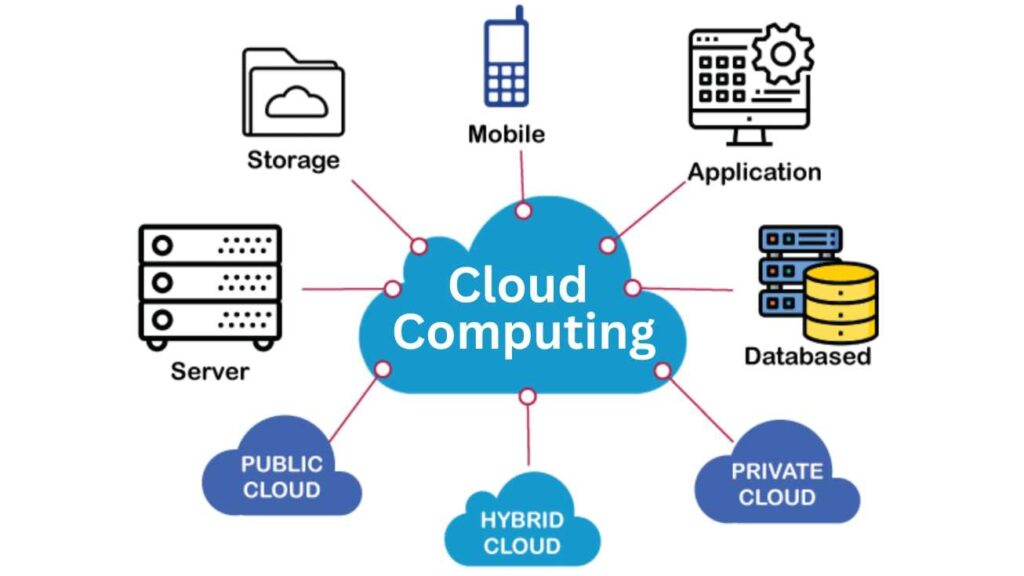
Annual Salary Range: ₦3M – ₦12M per year
Monthly Salary Range: ₦250K – ₦1M per month
What is Cloud Computing?
Cloud computing is the practice of using a network of remote servers hosted on the internet to store, manage, and process data, rather than a local server or a personal computer.
In simple terms, cloud computing means renting your data storage, applications, and other computing services over the Internet.
Cloud computing is one of the fastest-growing and highest-paying tech skills in Nigeria, driven by the increasing adoption of cloud technologies across industries.
As more and more businesses migrate to the cloud, the demand for cloud experts has skyrocketed.
The Public Cloud market in Nigeria is projected to grow by 27.38% (2024-2029) resulting in a market volume of US$2777.00m in 2029, according to the Statista Market Report.

Again, a survey conducted by IDC for Microsoft in 2022 shows that approximately 85% of organizations in Nigeria are already using the cloud for IT operations.
This shift is attributed to the advantages of cloud services, including cost savings, enhanced collaboration, business continuity, agility, and improved flexibility

Application Of Cloud Computing In Nigerian Industries:
- Banking: Secure storage of customer data and cloud-based banking services
- Oil and Gas: Remote monitoring of oil fields and data-driven exploration
- E-commerce: Scalable infrastructure for online marketplaces
- Healthcare: Telemedicine platforms and secure patient data storage
- Education: Cloud-based learning management systems
Some Cloud Computing Industry Tools: Amazon Web Services (AWS), Microsoft Azure, Google Cloud Platform (GCP), Kubernetes, Docker
Some Cloud Computing Skills Needed:
- Cloud architecture
- Cloud infrastructure management
- DevOps
- Cloud Security
Some Popular Roles In Cloud Computing: Cloud architect, cloud engineer, DevOps engineer
4. Cybersecurity: Safeguarding Digital Assets

Annual Salary Range: ₦2.5M – ₦15M per year
Monthly Salary Range: ₦208K – ₦1.25M per month
Cybersecurity involves defending computers, servers, mobile devices, electronic systems, networks, and data from malicious attacks.
It is the state of being protected against the criminal or unauthorized use of electronic data, or the measures taken to achieve this.
With the rise of cyber threats, cybersecurity has become one of the most lucrative tech skills in Nigeria, especially in the financial and telecommunications sectors.
The increasing frequency and sophistication of cyber attacks have made cybersecurity professionals indispensable.
The Nigeria Communications Commission (NCC) reported that the country loses an estimated $500 million per annum to cybercrime, emphasizing the critical need for cybersecurity experts.

Application Of Cyber Security In Nigerian Industries:
- Banking: Protection of financial data and securing online transactions
- Telecommunications: Safeguarding customer data and network security
- Government: Protecting national infrastructure and sensitive information
- Healthcare: Ensuring the privacy and security of patient records
- Energy: Securing critical infrastructure against cyber threats
Industry Tools: Kali Linux, Wireshark, Metasploit, Nessus, Snort, Splunk
Skills Needed:
- Ethical hacking
- Penetration testing
- Network security
- Cryptography
Popular Roles: Security analyst, ethical hacker, security engineer, information security manager
Some Current Statistics About Cyber Security In Nigeria
Here are some authentic statistics about the vast opportunities in Cyber Security for Nigeria and the Globe at large:
- Statistics By Nairametrics.
According to a survey by the International Information System Security Certification Consortium (ISC2), Nigeria has one of the lowest rates of cybersecurity specialists, although there are currently 4 million cybersecurity positions available worldwide.
Nigeria and South Africa, the two African nations included in the study, have greater gaps to be filled than other countries because they currently have fewer cybersecurity specialists than other countries, according to the global analysis.
In particular, South Africa had 57,269 cybersecurity specialists as of 2023, compared to 8,352 in Nigeria.
Nairametrics
2. Statistics by Statista.
The Cybersecurity market in Nigeria is projected to grow by 6.46% (2024-2029) resulting in a market volume of US$191.30m in 2029.
Statista
3. Statistics by (ISC)2 CYBERSECURITY WORKFORCE STUDY
According to our research, however, the cybersecurity field is still critically in need of more professionals. To adequately protect cross-industrial enterprises from increasingly complex modern threats, organizations are trying to fill the worldwide gap of 3.4 million cybersecurity workers.
(ISC)2 CYBERSECURITY WORKFORCE STUDY
These statistics show you beyond reasonable doubt that cybersecurity is highly in demand in Nigeria and anywhere in the world.
5. UI/UX Design: Crafting User-Centric Experiences

Annual Salary Range: ₦1.5M – ₦7M per year
Monthly Salary Range: ₦125K – ₦583K per month
User experience (UX) encompasses a user’s entire interaction with a product or website, whereas user interface (UI) in digital design refers to the interactivity, appearance, and feel of a product screen or web page.
UX design is all about identifying and solving user problems, while UI design is all about creating intuitive, aesthetically pleasing interfaces to make users happy and satisfied.
UI/UX design has emerged as one of the top 10 most profitable tech skills to learn in Nigeria as more and more businesses invest in exquisite digital experiences for their customers.
This is because companies are recognizing the direct correlation between user experience and business success.
Good UX design can improve user satisfaction and loyalty, leading to increased customer retention and potential word-of-mouth marketing.
Application Of UI/UX Design In Nigerian Industries:
- Fintech: Designing intuitive interfaces for financial apps
- E-commerce: Creating seamless shopping experiences
- Healthcare: Developing user-friendly telemedicine platforms
- Education: Designing engaging e-learning interfaces
- Government: Improving citizen-facing digital services
Some UI/UX design Industry Tools: Figma, Adobe XD, Sketch, InVision, Axure
UI/UX Design Skills Needed In Industries:
- User research
- Wireframing
- Prototyping
- Usability testing
- Interaction design
Popular Roles: UI/UX designer, product designer, interaction designer
On average, companies that put in the work to improve customer experience see a 42% improvement in customer retention, a 33% improvement in customer satisfaction, and a 32% increase in cross-selling and up-selling.
Maze.co
6. Digital Marketing and SEO: Driving Online Growth

Annual Salary Range: ₦2M – ₦8M per year
Monthly Salary Range: ₦150K – ₦500K per month
Digital marketing is the use of online platforms like social media, websites, email, and search engines to promote products, services, or brands to reach potential customers.
In fact, anything you do to market your services or products using digital platforms like websites, apps, social media, emails, etc., is considered digital marketing.
SEO (Search Engine Optimization) is a key part of digital marketing, where the goal is to improve a website’s visibility on search engines like Google.
Let me tell you what SEO does…
I know you always search for things online and then, you see different websites bringing up answers to your queries on search engines arranged numerically and on different pages, usually about 10 at first glance like in the image below;

That’s the power of SEO!
SEO helps your website show up higher in search results, making it easier for people to find you online by optimizing your content and using the right keywords.
As businesses increasingly move online, digital marketing and SEO have become some of the most profitable skills to learn in Nigeria.
As long as the internet exists, digital marketing and SEO will continue to be in high demand anywhere in the world!
Application in Nigerian Industries:
- E-commerce: Driving traffic and sales through SEO and social media marketing
- Real Estate: Online property marketing and lead generation
- Tourism: Promoting Nigerian destinations through digital channels
- Banking: Customer acquisition through targeted digital campaigns
- FMCG: Building brand awareness and engagement on social platforms
Industry Tools: Google Analytics, SEMrush, Ahrefs, Moz, Mailchimp, Hootsuite, WordPress
Skills Needed:
- Search engine optimization (SEO)
- Social media marketing
- Email marketing
- Content strategy
Popular Roles: Digital marketer, SEO specialist, content strategist, social media manager
The Nigerian digital advertising market is expected to grow, potentially reaching about $259 million by 2027, with mobile advertising being a significant driver of this growth. – Business Post Nigeria
7. Blockchain Technology: Revolutionizing Transactions

Annual Salary Range: ₦3.5M – ₦18M per year
Monthly Salary Range: ₦250K – ₦1.5 Million per month
Blockchain technology is a decentralized, secure system that does not require a central authority, such as a bank, to record digital transactions publicly.
Blockchain has a lot of potential in Nigeria, particularly in the financial services sector, where it can facilitate faster and less expensive money transfers.
It also makes it possible to create voting systems, digital identity verification, and safe, transparent supply chains.
While some can invest in cryptocurrencies, blockchain offers developers and entrepreneurs the opportunity to create cutting-edge apps.
Blockchain has the power to revolutionize businesses and expand financial inclusion in Nigeria as it develops, making it one of the most profitable tech skills to learn in Nigeria today.
Application in Nigerian Industries:
- Fintech: Development of cryptocurrency platforms and decentralized finance (DeFi) applications
- Supply Chain: Implementing transparent and traceable supply chain solutions
- Real Estate: Creating secure, decentralized property registries
- Healthcare: Developing secure systems for managing patient records
- Voting Systems: Building transparent and tamper-proof electronic voting platforms
Blockchain Industry Tools: Solidity, Ethereum, Hyperledger, Ripple, Truffle, Metamask
Skills Needed:
- Blockchain development
- Smart contract programming
- Distributed ledger technology (DLT)
Popular Roles: Blockchain developer, smart contract developer, crypto analyst
Nigeria ranked sixth in the 2021 Global Crypto Adoption Index published by blockchain analytics organization Chainalysis in October 2021. Factors driving cryptocurrency usage include a lack of access to traditional finance, depreciation of the naira and inflation. More than a third of Nigerians aged between 18 and 60 surveyed by cryptocurrency exchange KuCoin invest in cryptocurrencies, according to an April report. – S & P Global.
8. Artificial Intelligence (AI): Shaping the Future

Annual Salary Range: ₦3M – ₦15M per year
Monthly Salary Range: ₦250K – ₦1.25M per month
Artificial Intelligence (AI) is one of the most important tech skills to learn in 2024, with great opportunities in Nigeria and Africa.
When many people hear AI, their minds automatically go to ChatGPT and other Large Language Models (LLMs).
But AI is much more than that!
It involves creating machines and systems that can think, learn, and make decisions, simulating human intelligence across various fields like robotics, computer vision, and natural language processing.”
AI covers a broad range of technologies beyond LLMs, including machine learning, robotics, and decision-making systems that allow machines to perform tasks that typically require human intelligence.
In Nigeria, AI can transform sectors like healthcare, agriculture, and finance by automating tasks, analyzing big data, and solving complex problems.
For example, AI can help improve crop yields, detect diseases, and enhance customer service with chatbots.
So, learning AI opens doors to high-paying tech jobs in Nigeria, as businesses increasingly adopt AI to stay competitive and drive innovation.
Also, AI could contribute a staggering $15.7 trillion to the global economy, which is a figure surpassing the current combined output of China and India. [PWC Global]
This huge boost is expected to stem from increased productivity ($6.6 trillion) and consumption-side effects ($9.1 trillion) as almost every business adopts AI.
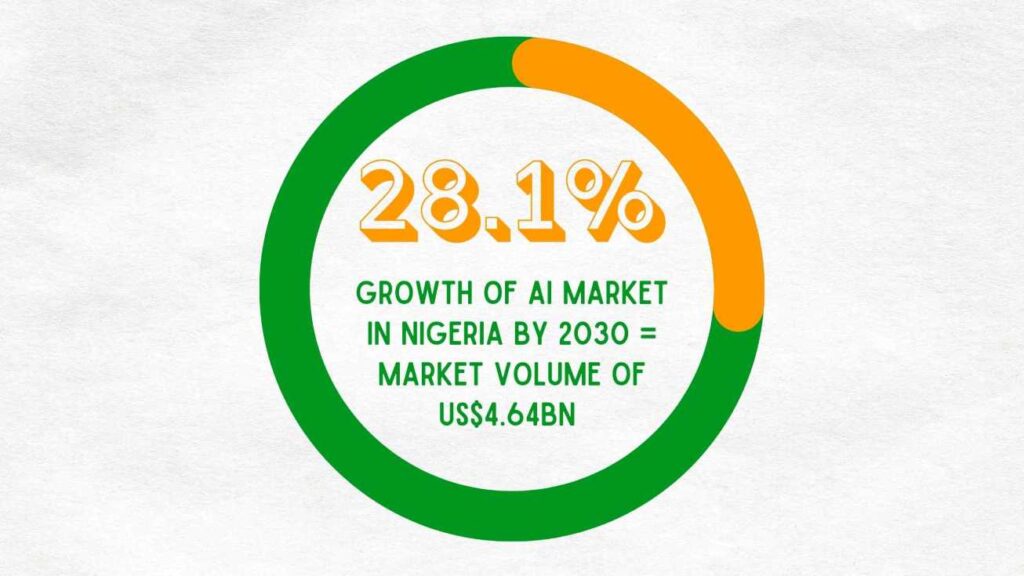
The Artificial Intelligence market in Nigeria is projected to grow by 28.10% (2024-2030) resulting in a market volume of US$4.64bn in 2030. – Statista
Application of AI in Nigerian Industries:
- Banking: AI-powered chatbots for customer service and fraud detection
- Healthcare: AI-assisted diagnosis and personalized treatment plans
- Agriculture: AI-driven crop monitoring and precision farming
- Manufacturing: Predictive maintenance and quality control
- Education: Personalized learning experiences and automated grading systems
Industry Tools: TensorFlow, Keras, PyTorch, OpenCV, Scikit-learn, IBM Watson
AI Skills Needed:
- Machine learning
- Deep learning
- Natural language processing (NLP)
- Computer vision
Popular Roles: AI engineer, machine learning engineer, NLP specialist
9. Internet of Things (IoT): Connecting the Physical and Digital

Annual Salary Range: ₦2M – ₦8M per year
Monthly Salary Range: ₦178K – ₦667K per month
The Internet of Things (IoT) is a technology that connects physical devices, like appliances, vehicles, and industrial machines, to the Internet, allowing them to communicate and share data.
In Nigeria, IoT presents exciting opportunities, particularly in areas like smart cities, where connected systems can improve transportation, energy use, and public safety.
Additionally, in industries like agriculture and manufacturing, IoT can automate processes, monitor equipment, and enhance productivity.
As Nigeria continues to adopt IoT, the question is:
Will the country fully harness this technology to drive sustainable growth and tackle local challenges head-on?
Well, Nigeria has the potential to fully harness IoT for sustainable growth, but doing so will depend on key factors like improving infrastructure, ensuring affordable internet access, and fostering government support through favorable policies and investments.
Already, there are positive steps being made, particularly with smart city projects and IoT solutions in agriculture and health.
However, to truly tackle local challenges, Nigeria needs to bridge the digital divide, train a workforce skilled in IoT technologies, and encourage private-sector collaboration.
Application of IoT in Nigerian Industries:
- Agriculture: Smart farming solutions for crop monitoring and livestock management
- Energy: Smart grid systems for efficient power distribution
- Healthcare: Remote patient monitoring and smart hospital management
- Manufacturing: Industrial IoT for improved efficiency and predictive maintenance
- Smart Cities: IoT-enabled traffic management and waste management systems
IoT Industry Tools: Arduino, Raspberry Pi, MQTT, Node-RED, AWS IoT
Skills Needed:
- Embedded systems programming
- Sensor technology
- IoT protocols and standards
- Data Analytics
Popular Roles: IoT developer, IoT solutions architect, embedded systems engineer
10. Mobile App Development: Tapping into the Mobile-First Market
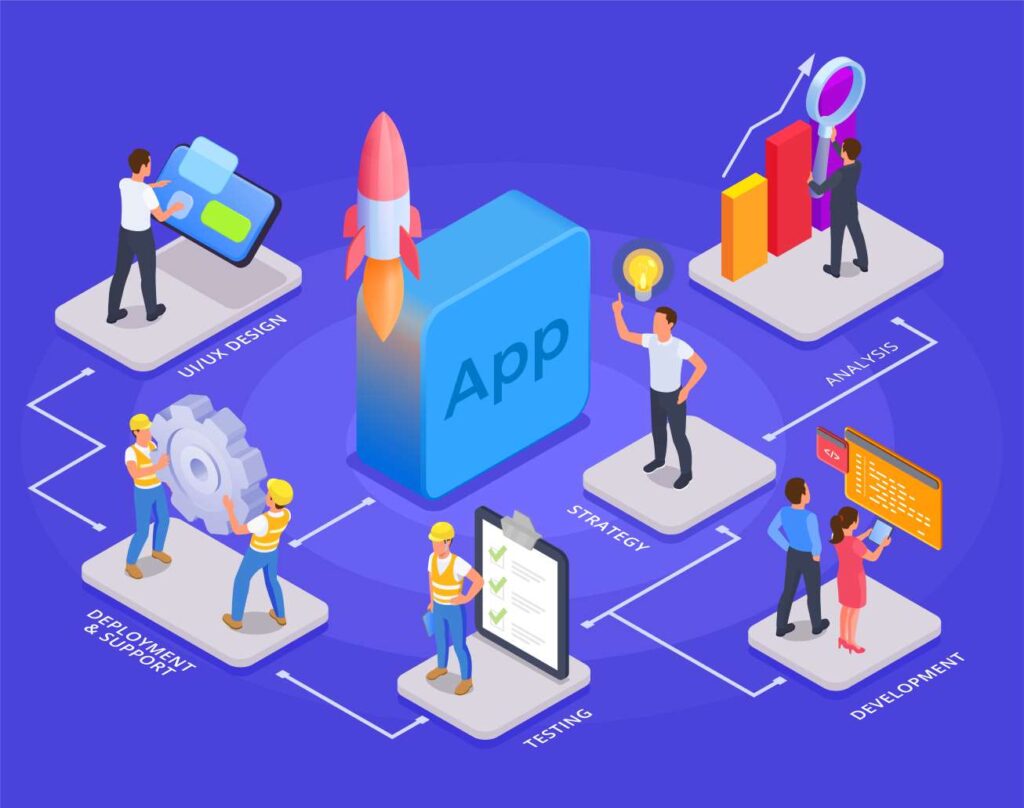
Annual Salary Range: ₦1.8M – ₦7M per year
Monthly Salary Range: ₦150K – ₦583K per month
Mobile app development is all about creating applications for smartphones, which is especially important in Nigeria, where most people access the internet primarily through mobile devices.
The mobile-first market in Nigeria offers huge opportunities, with demand for apps ranging from e-commerce, banking, and entertainment to education and healthcare.
As more businesses and services go digital, skilled app developers are needed to build user-friendly apps that meet local needs.
Imagine the possibilities yourself.
What innovative app could you create that would revolutionize how Nigerians access essential services?
Think about it…
Nigeria has over 170 million mobile subscriptions, with smartphone penetration expected to reach 60% by 2025.
According to Statista, smartphone penetration is set to grow to around 60 percent by 2025, presenting strong growth opportunities for feature phone and smartphone manufacturers alike.
Currently, estimates from different sources put the number of smartphone users in Nigeria at roughly between 25 million and 40 million.
Moreover, projections suggest that this number could significantly increase, with forecasts indicating that smartphone users in Nigeria may exceed 140 million by 2025 as penetration rates rise.
This simply shows that the mobile-first market creates a constant demand for innovative mobile applications across all sectors.
Application in Nigerian Industries:
- Fintech: Mobile banking and payment apps
- E-commerce: Mobile shopping platforms
- Transportation: Ride-hailing and logistics apps
- Entertainment: Mobile streaming and gaming apps
- Healthcare: Telemedicine and health monitoring apps
Industry Tools: Android Studio, Xcode, React Native, Flutter, Kotlin, Swift
Skills Needed:
- Native app development (Android/iOS)
- Cross-platform development
- Mobile UI/UX design
- App security
Popular Roles: Android developer, iOS developer, cross-platform mobile developer
Conclusion: Navigating Your Tech Career Path in Nigeria
From what we’ve discussed so far, you can see for yourself that the tech industry in Nigeria is brimming with opportunities for those with the right skills.
So, if you’re just starting your tech journey or looking to pivot to a more lucrative field, focusing on these top 10 most lucrative tech skills in Nigeria can set you on the path to a rewarding and high-paying career.
I hope I did justice in answering your questions like “What is the hottest tech skill in demand today?” or “Which tech skill pays the most?”
If I did or you still have more questions, then, leave a comment below!
FAQs: Most Lucrative Tech Skills To Learn in Nigeria
1. What are the top 10 most lucrative tech skills in Nigeria?
The top 10 most lucrative tech skills to learn in Nigeria, based on salary potential and demand, are:
- Artificial Intelligence and Machine Learning
- Cloud Computing
- Cybersecurity
- Data Science and Analytics
- Software Development (especially mobile and web)
- Blockchain Technology
- UI/UX Design
- DevOps
- Internet of Things (IoT)
- Digital Marketing and SEO
These skills are highly sought after across various industries, including fintech, e-commerce, banking, and telecommunications.
2. Which tech skills are most in demand in Nigeria?
The most in-demand tech skills in Nigeria currently include:
- Software Development (particularly mobile and web)
- Data Science and Analytics
- Cybersecurity
- Cloud Computing
- Artificial Intelligence and Machine Learning
These skills are crucial for Nigeria’s growing digital economy and are needed across multiple sectors, from fintech startups to established corporations undergoing digital transformation.
3. What is the highest paying tech skill in Nigeria?
While salaries can vary based on experience and specific roles, Artificial Intelligence and Machine Learning consistently rank among the highest-paying tech skills in Nigeria. Professionals in this field can earn between ₦3M to ₦15M annually, with senior roles commanding even higher salaries.
Cloud Computing and Cybersecurity are close contenders, also offering substantial salaries due to the critical nature of these skills in today’s digital landscape.
4. What are the top 5 tech skills to learn in 2024?
Based on industry trends and projected demand, the top 5 tech skills to learn in 2024 are:
- Artificial Intelligence and Machine Learning
- Cloud Computing and DevOps
- Cybersecurity
- Data Science and Analytics
- Blockchain Technology
These skills are not only in high demand but also offer excellent growth potential and competitive salaries in the Nigerian tech market.
5. What is the highest paying IT job in Nigeria?
The highest paying IT jobs in Nigeria often revolve around emerging technologies and leadership roles. Some of the top-paying positions include:
- Artificial Intelligence Engineer/Scientist
- Cloud Architect
- Cybersecurity Manager
- Data Scientist
- DevOps Engineer
Senior-level positions in these fields can command salaries ranging from ₦8M to ₦15M+ annually, depending on the company and specific responsibilities.
6. Which tech skill is the fastest to learn for a high-paying job?
If you’re looking for a relatively quick path to a high-paying tech job in Nigeria, consider UI/UX Design or Digital Marketing. These fields have a lower entry barrier compared to more technical roles like AI or Software Development, and you can start building a portfolio quickly.
With dedicated study and practice, you could become proficient in UI/UX Design or Digital Marketing within 3-6 months. Both fields offer good earning potential, with salaries ranging from ₦1.5M to ₦7M annually, depending on your skill level and experience.
7. What are the most profitable skills to learn in Nigeria?
The most profitable skills to learn in Nigeria combine high demand with substantial earning potential. These include:
- Software Development
- Data Science
- Artificial Intelligence
- Cloud Computing
- Cybersecurity
- Digital Marketing
These skills are not only lucrative but also offer opportunities for entrepreneurship and freelancing, allowing you to maximize your earning potential.
8. What are the highest paying tech jobs in the world that Nigerians can access remotely?
With the rise of remote work, Nigerians can access high-paying global tech jobs. Some of the highest-paying roles include:
- Senior Software Engineer
- AI/Machine Learning Engineer
- Cloud Architect
- Cybersecurity Specialist
- Blockchain Developer
These roles can offer salaries ranging from $80,000 to $150,000+ annually when working for international companies, significantly higher than local Nigerian salaries.
9. What are the top 4 high-paying skills in Nigeria for quick career advancement?
If you’re looking for tech skills to learn that offer both high pay and quick career advancement in Nigeria, consider:
- Data Science
- Cloud Computing
- Mobile App Development
- Digital Marketing
These skills are in high demand across various industries, offer good starting salaries, and provide ample opportunities for career growth and advancement.
10. What are the best tech skills for women to learn in Nigeria?
While all tech skills are gender-neutral, some fields in Nigeria have been particularly welcoming to women and offer great opportunities:
- UI/UX Design
- Data Analysis
- Digital Marketing
- Project Management (in tech)
- Quality Assurance (QA) Testing
These fields offer a good balance of technical skills and soft skills, provide competitive salaries, and often have more flexible work arrangements, which can be beneficial for work-life balance.
11. What is the fastest growing career in tech in Nigeria?
Artificial Intelligence and Machine Learning represent the fastest-growing tech careers in Nigeria. The AI market in Nigeria is expected to grow at a CAGR of 28% from 2023 to 2027, creating a surge in job opportunities.
Other rapidly growing fields include:
- Cloud Computing
- Data Science
- Cybersecurity
- Fintech Development
These careers are not only growing quickly but also offer high salaries and excellent long-term prospects.
12. Which tech skills in Nigeria offer the best combination of high salary and work-life balance?
If you’re looking for tech skills that offer both high salaries and good work-life balance in Nigeria, consider:
- UI/UX Design
- Data Analysis
- Cloud Engineering
- Digital Marketing
- Technical Writing
These fields often offer more flexible working hours and the possibility of remote work, while still providing competitive salaries. They tend to have lower stress levels compared to roles like cybersecurity or certain software development positions, which may require on-call duties or frequent overtime.
Remember, work-life balance can vary depending on the specific company and role, so it’s always important to research potential employers and discuss expectations during the interview process.


